Key takeaways:
- Skill development is essential for adapting to changing environments and fostering confidence, leading to personal and professional growth.
- Effective learning strategies include setting measurable goals, interleaved practice, and regular reflection to enhance retention and understanding.
- Engaging with community resources, such as forums and online tutorials, significantly enriches the learning experience and encourages collaboration.
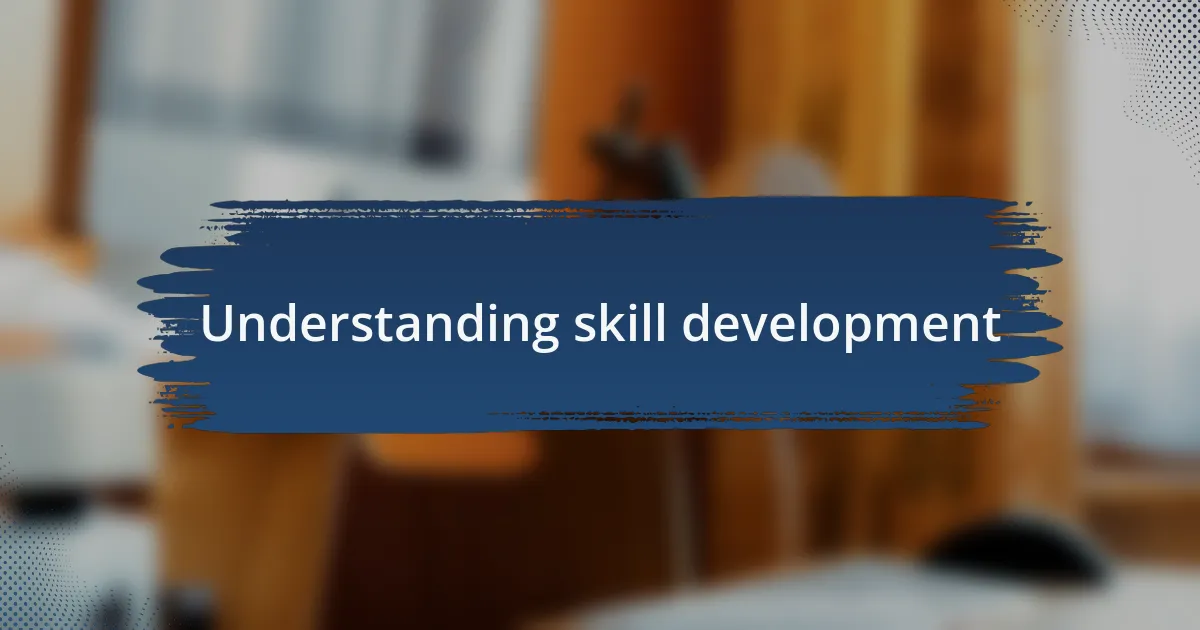
Understanding skill development
Understanding skill development is essential in today’s fast-paced world. It’s not just about acquiring new abilities; it’s about adapting to changing environments and technologies. I remember when I first encountered coding; it felt like learning a new language. How many of us have faced that daunting gap between where we are and where we want to be?
Skill development often takes us on a journey filled with challenges and small victories. Each time I pushed through a tough programming problem, I felt a sense of achievement that fueled my motivation. Have you experienced a similar rush when mastering a difficult concept? It’s in these moments that we truly realize our potential and the power of persistence.
Additionally, the process of developing a skill goes beyond mere practice; it’s about immersing ourselves in new experiences. I once attended a workshop that transformed my understanding of graphic design. The hands-on approach was enlightening; it forced me to think creatively and outside the box. Have you considered how different learning environments can reshape your skill set? It’s fascinating how our surroundings can mold our development journey.
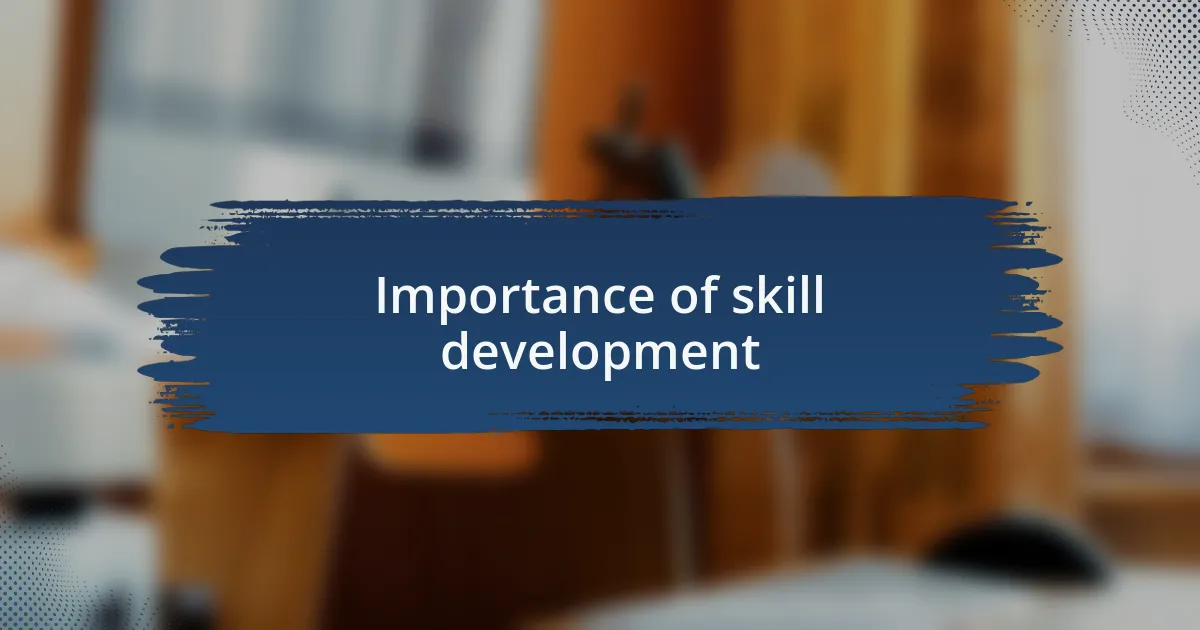
Importance of skill development
Skill development is crucial because it enables individuals to stay relevant in an ever-evolving job market. I vividly recall a time when I was hesitant to embrace new software updates in Windows. I realized that resisting change only hindered my productivity. How often do we cling to what we know instead of embracing new tools that could enhance our efficiency?
Moreover, cultivating new skills fosters confidence and self-efficacy. I once took a course in project management, which not only improved my organizational capabilities but also reassured me that I could lead a team effectively. Have you experienced a similar boost when mastering a new skill? It’s empowering to recognize that we are capable of navigating challenges with the right tools and knowledge.
Lastly, skill development is a pathway to both personal and professional growth. The moment I started sharing my newly gained expertise with others, I found joy in mentoring. It hit me that teaching is an incredible way to deepen one’s understanding. How rewarding is it to contribute to someone else’s journey by sharing what you know? That exchange truly illustrates the ripple effect of continuous learning and growth.
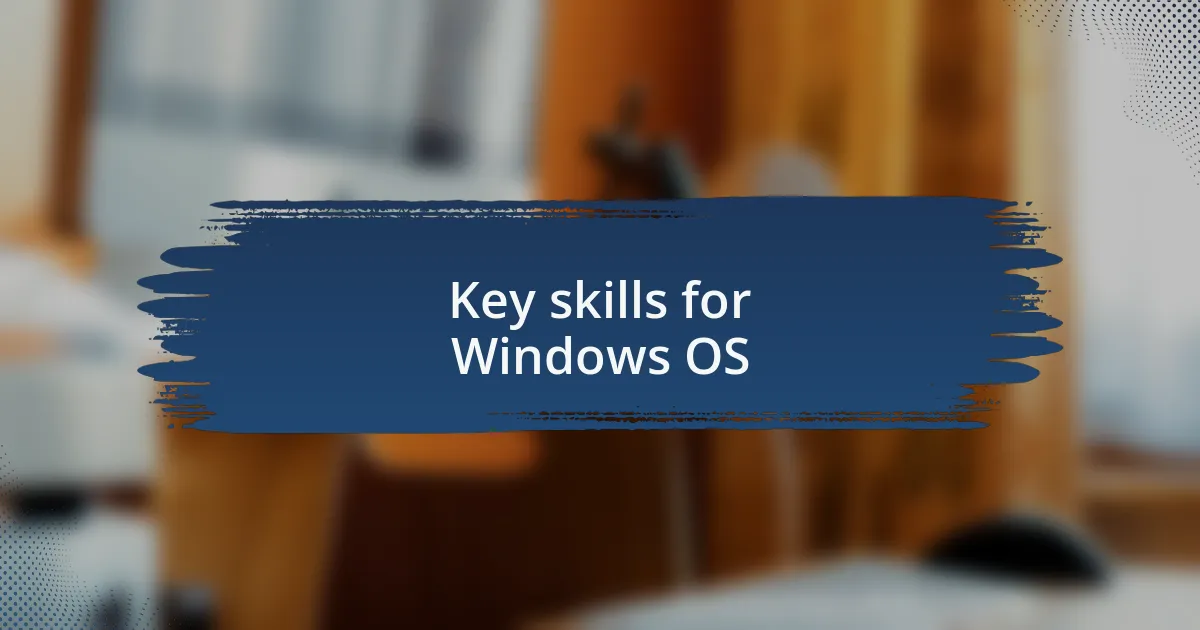
Key skills for Windows OS
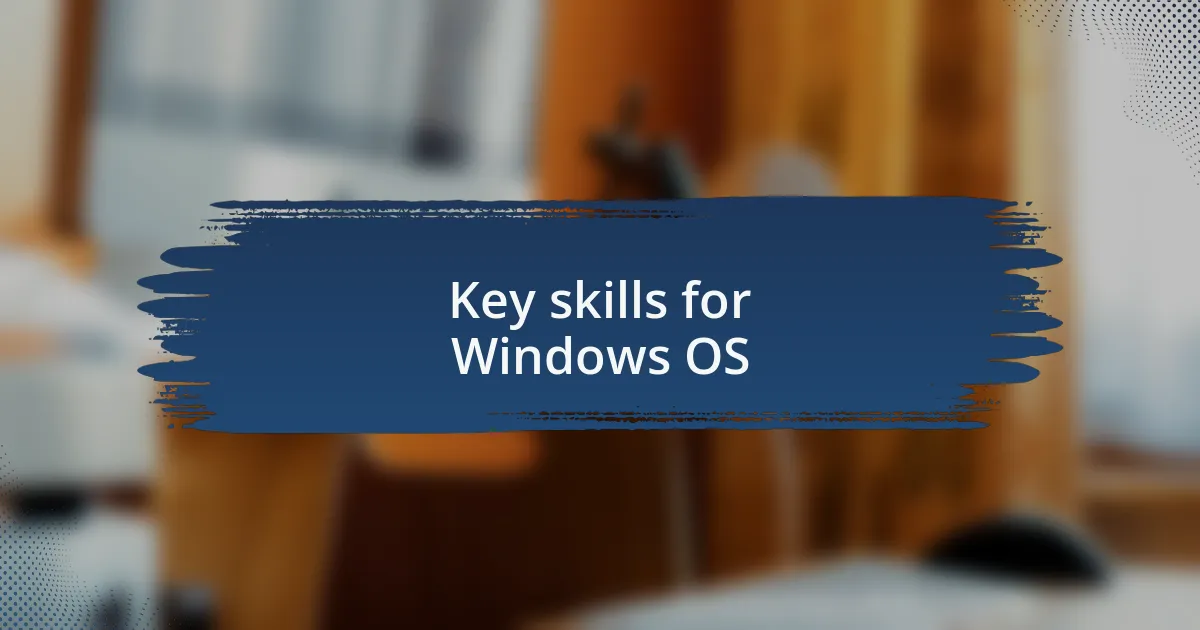
Key skills for Windows OS
Navigating the Windows OS effectively requires a fundamental understanding of file management and software applications. I remember struggling with organizing my files in the early days, often losing track of important documents. It was a frustrating experience that taught me the value of a well-structured file system; having everything in its place not only saves time but also reduces stress. How do you ensure your digital workspace is organized?
Another essential skill is troubleshooting common issues that arise within the OS. Early on, I faced a multitude of errors that made me feel powerless over my device. However, I decided to tackle those challenges head-on — researching solutions and experimenting with problem-solving techniques. This proactive approach not only gave me a sense of control but also built my confidence in using technology. Have you ever taken the time to dissect and resolve a tech issue? It’s an enlightening process that can significantly improve your technical acumen.
Lastly, familiarity with system security is paramount in today’s digital landscape. I learned this lesson the hard way when I neglected to enable a firewall, only to face a minor security scare. It taught me the necessity of understanding Windows security settings and adopting best practices to safeguard my data. Have you reviewed your security measures lately? Taking the time to fortify your digital security can provide peace of mind and protect your valuable information.
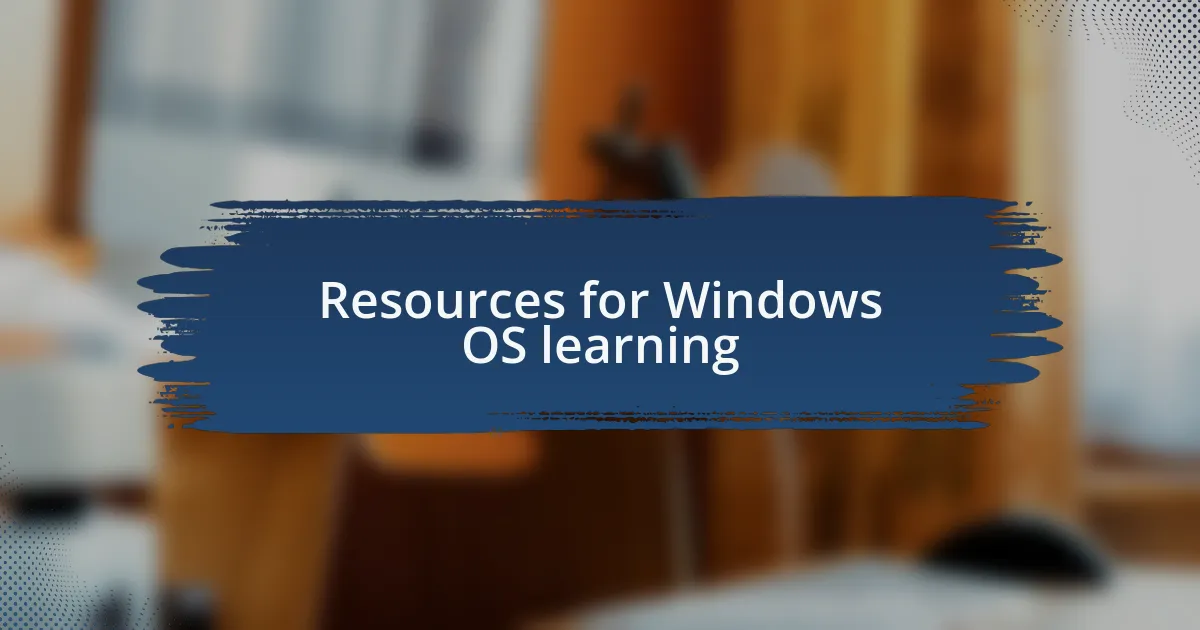
Resources for Windows OS learning
I found that one of the best resources for mastering Windows OS is the Microsoft Learn platform. The interactive modules and guided learning paths have been incredibly helpful for me, especially when I wanted to deepen my understanding of new features introduced in Windows updates. Have you explored this resource? I often recommend it to friends looking to enhance their skills.
Another valuable resource is the community forums, like Microsoft’s own Tech Community. I remember sharing a tricky issue I faced with a Windows update, and the responses I received were eye-opening. Not only did I solve my problem, but I also learned tips and tricks that I wouldn’t have discovered otherwise. Engaging with peers can truly enrich your learning experience; have you ever participated in a discussion that changed your perspective?
YouTube tutorials also serve as a fantastic visual aid in learning Windows OS. I’ve often turned to video guides when I needed to learn about specific software features quickly. Watching someone walk through the steps made the process less intimidating and more accessible for me. Do you think a visual demonstration helps you grasp concepts better? I certainly believe it can bridge the knowledge gap effectively.
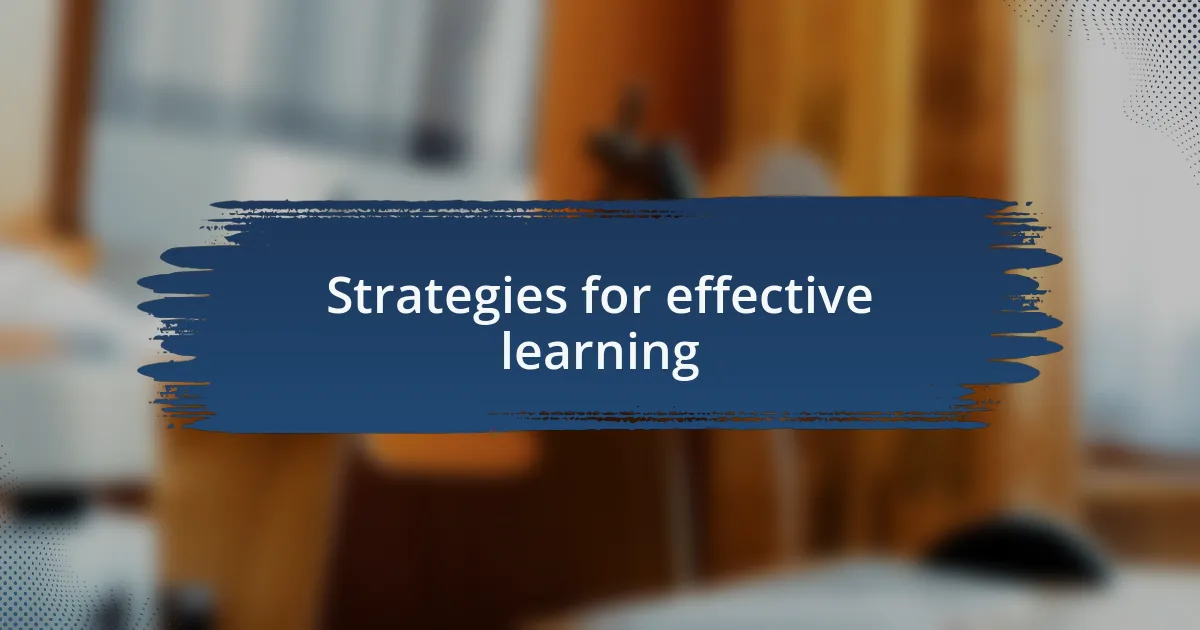
Strategies for effective learning
Effective learning strategies really can make a difference in mastering any new skill, including navigating Windows OS. One method that I’ve found especially beneficial is setting specific, measurable goals. For instance, when I aimed to proficiently use PowerShell, I broke down my goal into manageable chunks, dedicating time each week to practice different commands. This approach not only kept me focused but also boosted my confidence as I ticked off each milestone.
Another strategy that has worked wonders for me is the “interleaved practice” technique. Instead of practicing one skill repeatedly, I mix different topics. I remember a session where I alternated between learning about file management and exploring system security settings. This method not only kept my learning fresh and exciting but also helped me see connections between different aspects of Windows OS, enhancing my overall understanding.
Also, reflecting on what I learned is crucial in retention. After each study session, I take a few moments to jot down key takeaways. There was a time I overlooked this and struggled to recall information during a project. Now, I can honestly say these reflections have transformed my learning experience, making it more intentional. Have you considered how reflecting can anchor your knowledge? It truly makes a significant difference in how we retain what we learn.
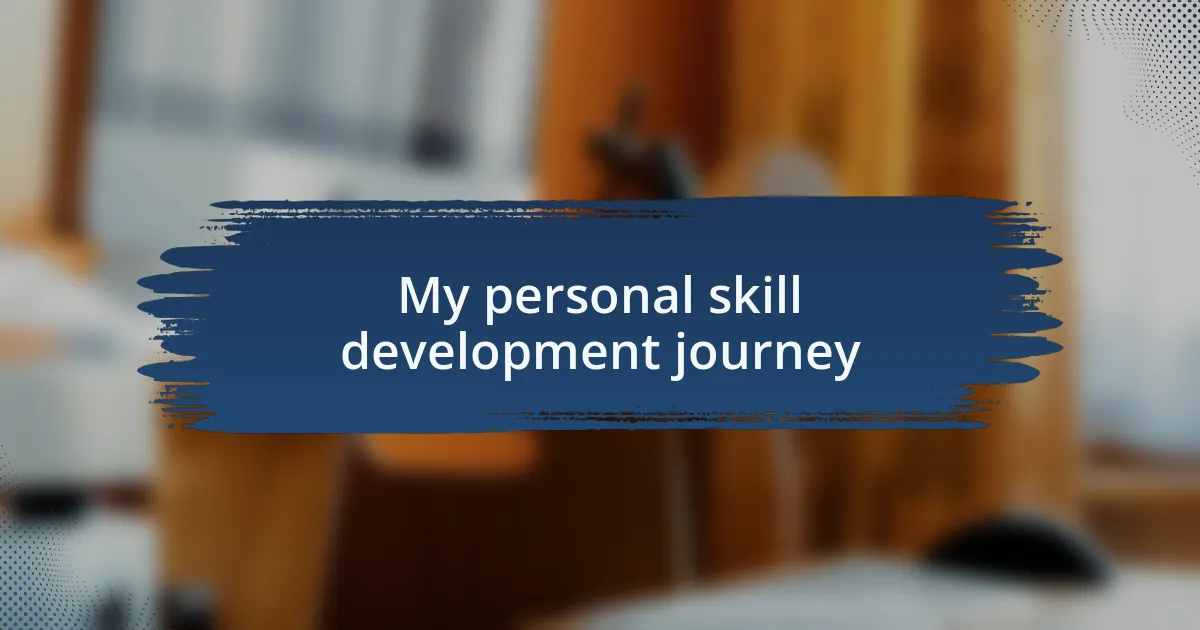
My personal skill development journey
I remember the first time I delved into skill development; it felt overwhelming. Initially, I was just trying to grasp the basics of Windows OS without a clear direction. But as I reflected on my experience, I realized that through consistent practice and revisiting my goals, I began to see progress. Have you ever felt lost on your learning journey? It’s a common feeling, but acknowledging it can pave the way for growth.
One significant turning point for me was when I sought out community forums and resources online. I vividly recall a moment when I struggled with a system error while working on a project; feeling frustrated, I turned to a forum where I shared my issue. The feedback I received not only solved my problem but also opened my eyes to the wealth of knowledge our community offers. It’s moments like these that enhanced my understanding and encouraged me to become more active in my learning.
As I moved forward, I discovered the power of collaboration. I began joining study groups where we tackled complex topics together. There’s something rewarding about discussing ideas with peers and sharing experiences. How often do we take the time to collaborate with others on our skill development? For me, these collaborative efforts transformed my skillset and deepened my appreciation for the different perspectives that come with learning together.
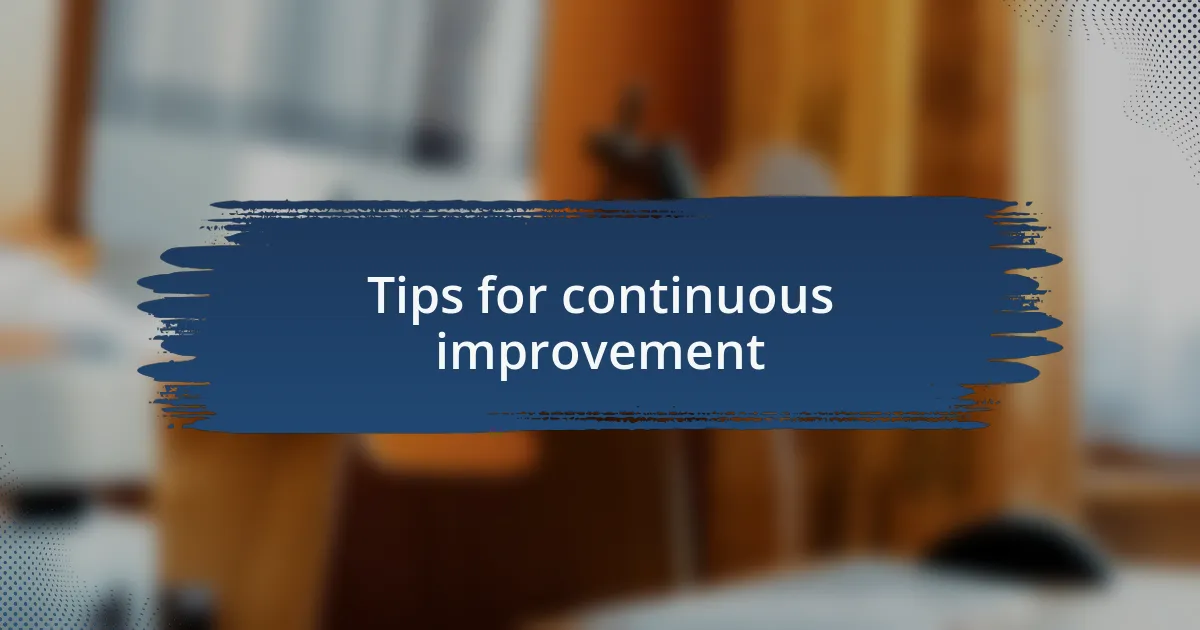
Tips for continuous improvement
One practical tip for continuous improvement is to set aside time for reflection. Personally, I find that taking a moment to assess my progress helps me identify areas that need more focus. Have you ever taken stock of what you’ve learned and realized there’s something you still don’t quite grasp? This kind of reflection not only highlights gaps in knowledge but also boosts motivation as you map out the steps to fill those gaps.
Embracing feedback is another vital aspect of growth. I remember receiving constructive criticism from a mentor after a presentation I thought was flawless. At first, my ego was a bit bruised, but I quickly learned to view feedback as a tool for enhancement. How can we grow if we shy away from honest evaluations? This experience taught me that seeking input, whether from peers or mentors, can spark significant improvements in my skillset.
Lastly, I highly recommend engaging with diverse materials beyond your usual resources. When I began exploring books, podcasts, and even videos outside my traditional learning paths, I was surprised at how fresh perspectives ignited my enthusiasm for skill development. Is there a book or a podcast that has shifted your understanding? By broadening your inputs, you allow yourself to absorb new ideas, making the journey of skill development more vibrant and dynamic.